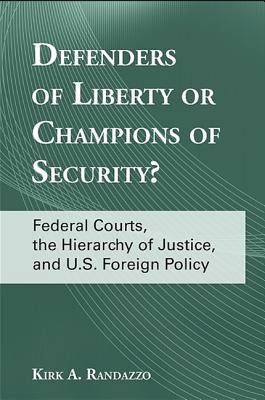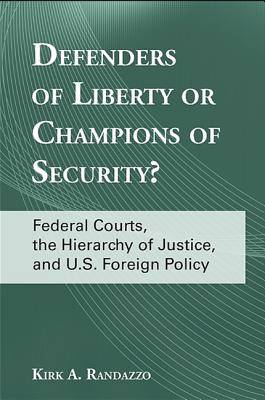
Door een staking bij bpost kan je online bestelling op dit moment iets langer onderweg zijn dan voorzien. Dringend iets nodig? Onze winkels ontvangen jou met open armen!
- Afhalen na 1 uur in een winkel met voorraad
- Gratis thuislevering in België vanaf € 30
- Ruim aanbod met 7 miljoen producten
Door een staking bij bpost kan je online bestelling op dit moment iets langer onderweg zijn dan voorzien. Dringend iets nodig? Onze winkels ontvangen jou met open armen!
- Afhalen na 1 uur in een winkel met voorraad
- Gratis thuislevering in België vanaf € 30
- Ruim aanbod met 7 miljoen producten
Zoeken
Defenders of Liberty or Champions of Security?
Federal Courts, the Hierarchy of Justice, and U.S. Foreign Policy
Kirk A Randazzo
€ 151,45
+ 302 punten
Uitvoering
Omschrijving
The terrorist attacks of September 11, 2001, and the subsequent responses by the U.S. federal government have raised fundamental questions about civil liberties in both domestic and international laws. As a result, the U.S. judiciary, out of its responsibility for interpreting the Constitution, has assumed a crucial role in defining boundaries of domestic and foreign policy, and in balancing concerns about security with the protection of liberty. Utilizing a sophisticated blend of quantitative and qualitative analysis, Kirk A. Randazzo examines two main questions: To what extent do federal judges defend liberty or champion security when adjudicating disputes? And to what extent does the hierarchal structure of the federal judiciary influence decisions by lower court judges? There are, he argues, disturbing indications that the federal judiciary as a whole are not defenders of liberty. Furthermore, lower court judges strategically anticipate the decisions of higher courts and constrain their behavior to avoid reversal.
Specificaties
Betrokkenen
- Auteur(s):
- Uitgeverij:
Inhoud
- Aantal bladzijden:
- 138
- Taal:
- Engels
- Reeks:
Eigenschappen
- Productcode (EAN):
- 9781438430478
- Verschijningsdatum:
- 15/03/2010
- Uitvoering:
- Hardcover
- Formaat:
- Genaaid
- Afmetingen:
- 157 mm x 234 mm
- Gewicht:
- 362 g

Alleen bij Standaard Boekhandel
+ 302 punten op je klantenkaart van Standaard Boekhandel
Beoordelingen
We publiceren alleen reviews die voldoen aan de voorwaarden voor reviews. Bekijk onze voorwaarden voor reviews.











